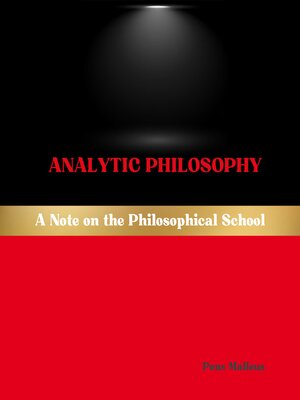Analytic Philosophy
audiobook (Unabridged) ∣ A Note on the Philosophical School · Western Philosophical Schools
By Pons Malleus

Sign up to save your library
With an OverDrive account, you can save your favorite libraries for at-a-glance information about availability. Find out more about OverDrive accounts.
Find this title in Libby, the library reading app by OverDrive.



Search for a digital library with this title
Title found at these libraries:
| Library Name | Distance |
|---|---|
| Loading... |
This audiobook is narrated by a digital voice.
This audiobook is an introduction to analytic philosophy—a school of thought that has shaped much of contemporary philosophy in the English-speaking world. Emerging in the early 20th century, analytic philosophy redefined the nature of philosophical inquiry by emphasizing clarity, logical rigor, and linguistic analysis. It distinguished itself from older metaphysical traditions and from the more historically and continentally rooted strands of philosophy by striving to make philosophical problems more tractable, if not always solvable, through careful reasoning and attention to language.
Analytic philosophy is not a unified doctrine. It does not rest on a single set of claims or a common body of conclusions. Instead, it is defined more by its method and temperament: a commitment to argument over rhetoric, to detail over grandeur, and to a disciplined use of language as the primary tool of philosophical investigation. As a result, analytic philosophy has tackled a wide array of subjects—logic, epistemology, philosophy of language, ethics, metaphysics, and philosophy of mind—with a level of precision that has become both its hallmark and its greatest source of criticism.
The origins of this movement can be traced to figures such as Gottlob Frege, Bertrand Russell, G.E. Moore, and Ludwig Wittgenstein, whose early 20th-century writings marked a radical departure from the dominant philosophical paradigms of their time. Frege's innovations in logic and the philosophy of language laid the groundwork for a more rigorous treatment of meaning and reference. Russell's clarity and systematic ambition brought new life to philosophical analysis, while Moore's commonsense realism challenged idealism by demanding that philosophical language mirror ordinary usage. Wittgenstein, in both his early and later work, provided foundational critiques that shifted the course of the movement, influencing generations of thinkers.







